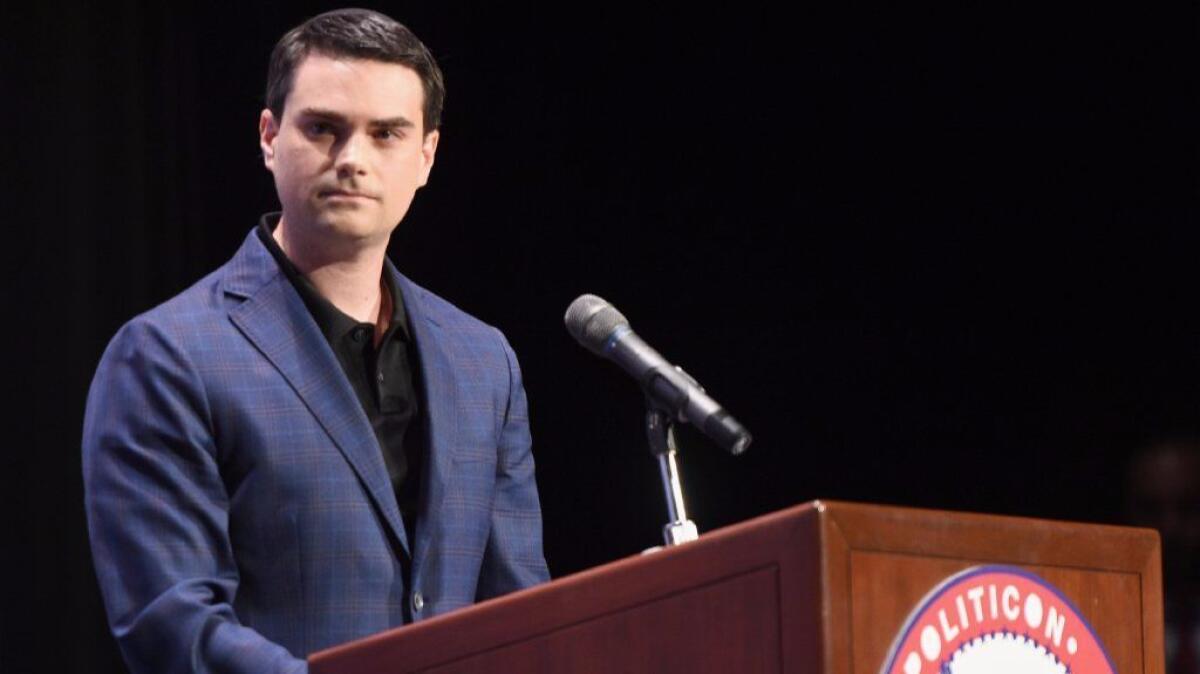Berkeley braces for right-wing talk show host Ben Shapiro’s visit

Girding itself for a visit from another polarizing political figure and the possibility of more violent protests, UC Berkeley is tightening campus security.
In a message sent earlier this week, Provost Paul Alivisatos said the university was taking precautions in advance of the Sept. 14 visit by conservative political commentator and former Breitbart editor Ben Shapiro. There will be a “closed perimeter” around the building where Shapiro is scheduled to speak, and an “increased and highly visible police presence.”
A number of university buildings near Zellerbach Hall, the event’s location, will be closed that afternoon. In order to pass through security barriers, people will have to show tickets for the speech.
The university also is offering counseling to students and faculty worried about the event, which is being held at the invitation of the Berkeley College Republicans.
“We are deeply concerned about the impact some speakers may have on individuals’ sense of safety and belonging,” Alivisatos said in the memo posted on the university’s website. “No one should be made to feel threatened or harassed simply because of who they are or for what they believe.”
The memo drew scorn from conservative websites, including the Daily Wire, where Shapiro serves as editor in chief. The site called the measures extreme and criticized them as a sign of the university’s intolerance.
Known as the birthplace of the Free Speech Movement, UC Berkeley has struggled in recent months to strike a balance between public safety and the right of campus organizations to host controversial speakers. Some of these events have drawn protesters more eager to exchange blows than ideas.
Over the spring and into the summer, violent protests shut down appearances by right-wing authors and provocateurs Milo Yiannopoulos and Ann Coulter, who canceled her visit after the campus groups hosting her pulled out.
Last month, Berkeley Chancellor Carol T. Christ announced the launch of a “Free Speech Year” — a series of events meant to show students how to debate issues in a respectful manner.
Christ also acknowledged the need for stricter public safety measures and more police officers.
Under an interim policy, the university is requiring campus groups sponsoring large events to cover basic costs and give notice weeks ahead. Campus police are expected to provide security assessments of any situations that could threaten public safety.
Why Berkeley? How the university became epicenter of violent clashes »
In response to the violence, the Berkeley City Council is considering lifting a two-decade ban on the use of pepper spray by police officers as a crowd-control tactic.
According to a letter from Chief of Police Andrew Greenwood to the mayor and City Council members, officers carry pepper spray on their equipment belts, but department records show they rarely use it. The proposal would allow them to use the spray to subdue “violent activity in a crowd situation.”
“Currently the Berkeley Police Department is hampered during crowd events in addressing coordinated groups of violent offenders because the only tools available are batons, less lethal projectiles, smoke, and tear gas canisters,” Greenwood wrote.
The police chief’s letter includes photographs of recent campus protests showing explosives detonating near officers. Others show black-clad protesters with the anti-fascist movement — commonly known as “antifa” — hitting people with homemade shields and attacking bystanders.
If approved, the amended policy would prohibit police officers from using the spray against “passively-resisting, non-violent individuals.”
The City Council is expected to vote on the proposal Tuesday — two days before Shapiro’s visit.
Twitter: @annamphillips
More to Read
Sign up for Essential California
The most important California stories and recommendations in your inbox every morning.
You may occasionally receive promotional content from the Los Angeles Times.











